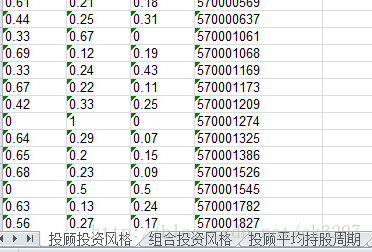使用xlwt将json文件,写入xls文件
json文件
{"stock_hold_cycle":205,"end_date":"20170601","fare":0.0,"cost":0.0,"sell_balance":0.0,"user_id":"100000877","begin_date":"20160819","fund_account":"100000877","stock_code":"603031","buy_balance":0.0}
{"stock_hold_cycle":261,"end_date":"20170601","fare":0.0,"cost":0.0,"sell_balance":0.0,"user_id":"100000877","begin_date":"20160602","fund_account":"100000877","stock_code":"732031","buy_balance":0.0}
{"stock_hold_cycle":261,"end_date":"20170601","fare":46.1,"cost":64183.94,"sell_balance":60160.0,"user_id":"100000877","begin_date":"20160602","fund_account":"100000877","stock_code":"300287","buy_balance":124234.0}上述是json文件的样式,一行一组数据。每个json文件内的每一行的key字段是一致的,不同json文件内的每一行key字段会不同。
需求
1、需要将每个json文件的数据导出,以xls的格式保存。
2、xls文件的首行是json文件的key字段,每行数据的对应key字段的值,依次写入到xls文件内,字段值要对应。
样式转换举例:
原数据为
{"stock_hold_cycle":205,"end_date":"20170601"}
{"stock_hold_cycle":20,"end_date":"20170611"}需转成下述样式:
| stock_hold_cycle | end_date |
|---|---|
| 205 | 20170601 |
| 20 | 20170611 |
3、每一个json文件的数据一个sheet页,若有10个json文件,则需在一个xls文件内创建10个sheet,存入对应数据。
实现
1、json文件 –> 字典
with open(file, "r", encoding="utf-8") as f:
while True:
read_line = f.readline()
if not read_line:
break
json_line = json.loads(read_line)上述代码块,按行读取文件,然后转换成字典项,若读取行数据为空,就判断为文件读取完毕,结束读取过程。
2、对字典项进行排序
list_json_line = sorted(json_line.items(), key=lambda d:d[0]) #以字典的key排序
list_json_line = sorted(json_line.items(), key=lambda d:d[1]) #以字典的value排序上述排序,是按照sort方法默认排序。
3、创建xls文件
wt = xlwt.Workbook() # 创建一个对象
table = wt.add_sheet("sheet1", cell_overwrite_ok=True) # 创建一个表格(sheet)页
table.write(j, i, data) #写入数据,j是行,i是列,data是写入数据
wt.save(name) #保存xls文件源码
# -*- coding: utf-8 -*-
__author__ = "chenk"
import os, json
import xlrd, xlwt
from collections import namedtuple
def create_xls():
"""创建xls文档对象"""
wt = xlwt.Workbook()
# table = wt.add_sheet("sheet1", cell_overwrite_ok=True)
return wt
def get_tag_name(path=r"C:\Users\Administrator\Desktop\xxx\scripts", file_name="tag_name.json"):
"""pass"""
current = os.getcwd() #获取当前运行路径
os.chdir("/")
os.chdir(path)
with open(file_name, "r", encoding="utf-8") as f:
f_read = f.read()
read_json = json.loads(f_read)
os.chdir("/")
os.chdir(current)#设置运行路径为原运行路径
return read_json
def file_to_xls(path):
os.chdir("/")
os.chdir(path)
wt = create_xls()
tag_name = get_tag_name()
for each in os.listdir("."):
if "_HuaAn.txt" in each:
sheet_name = tag_name[each[:-len("_HuaAn.txt")]]["name"]
table = wt.add_sheet(sheet_name, cell_overwrite_ok=True) #创建table
flag = False # 判断xls文件是否写入首行字段标题栏
j = 1 # 列
print("*"*20, each, sheet_name)
with open(each, "r", encoding="utf-8") as f:
while True:
read_line = f.readline()
if not read_line:#文件读取数据不为空
name = "xxx.xls" #保存文件名
wt.save(name) #保存xls文件
break
json_line = json.loads(read_line) #转换成json
list_json_line = sorted(json_line.items(), key=lambda d:d[0]) #以字典的key排序
if not flag:
length = len(list_json_line)
temp = 0
for i in range(length):
key = list_json_line[i][0]
table.write(0,temp,key)
temp += 1
flag = True
else:
try:
# i为列, j为行
for i in range(length):
try:
table.write(j, i, list_json_line[i][1])
except:
print(each, i, j, "*"*20)
j += 1
except Exception as e:
name = "xxx.xls"
wt.save(name)
print(each, i, j)
print(str(e))
break
if __name__ == "__main__":
file_to_xls(r"C:\Users\Administrator\Desktop\xxx\scripts\xxx")
